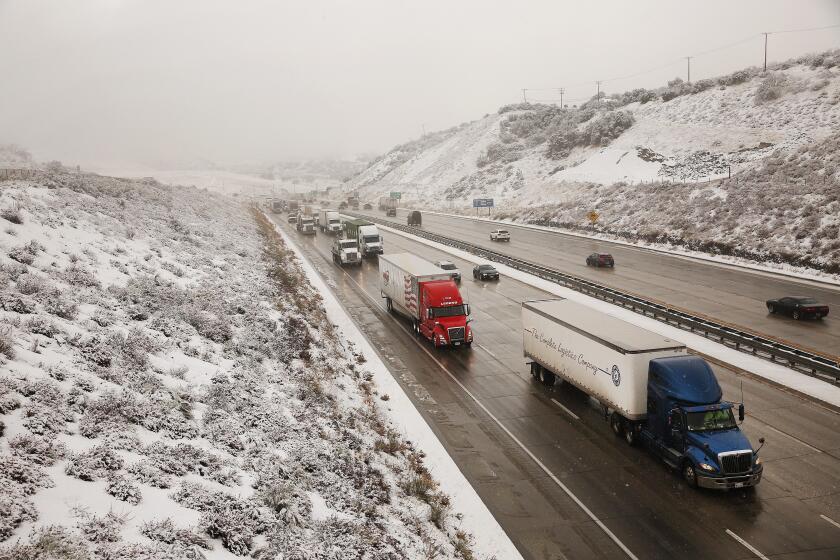Union Founder Defiant Amid Strike’s Drama
It’s a story of a dream, hard work, grand emotions and livelihoods hanging in the balance -- preferably to the music of Puccini.
Like characters in the Italian operas he loves, the founder of the mechanics union striking Northwest Airlines Corp. is a passionate man of strongly held beliefs and defiance. Those traits have helped put O.V. “Dell” Delle-Femine at the center of one of the most widely watched melodramas in U.S. labor relations in years.
When the nation’s fourth-largest airline said it needed $1.1 billion in concessions from workers to avoid filing for bankruptcy protection, pilots and managers took cuts in pay. But Delle-Femine’s fiercely independent Aircraft Mechanics Fraternal Assn. refused. Targeted for $176 million in concessions -- including a 25% pay cut and the possible elimination of 2,000 of the 4,500 mechanic’s jobs -- the union went on strike Aug. 20.
From the start, other unions declined to honor the mechanics’ picket lines, and replacement workers that the airline lined up during 1 1/2 years of preparations have kept the planes in the skies and generally on time.
That’s led some analysts to wonder whether the mechanics’ strike will be a labor disaster like the failed strike by air traffic controllers in 1981 -- another canary in the coal mine of labor health.
In an interview Friday at the union’s national headquarters in Laconia, Delle-Femine (pronounced dell-FEM-uh-knee), 72, was undeterred. He said Northwest’s real agenda was to destroy all its unions.
“We’re really fighting for all labor, because if they can try to bust us, they’re going to try to bust those other unions, mark my words,” he said.
Delle-Femine insisted that Northwest was suffering seriously because of the strike even as it reported otherwise. And he said the union would hold out because it had no other choice.
“They gave us proposals we could never agree to,” he said.
Northwest spokesman Kurt Ebenhoch said Friday that the company was willing to discuss other combinations of pay cuts or layoffs as long as it reached its target savings. And, rather than seeking to break unions, the airline says it is simply doing what it must to survive.
A Rhode Island native whose grandparents came from Italy, Delle-Femine first got the idea that airline mechanics needed their own union when he was working as one in the early 1960s at airports in New York and Boston.
“I went to meetings. I said, gee, we’re a minority here. Who represents us?”
Delle-Femine began talking to mechanics about forming a new union. An eager reader, he also learned about organizing through books.
In 1962, Delle-Femine and two partners formed the Aircraft Mechanics Fraternal Assn. and in 1964 got Ozark Airlines’ mechanics to join. He soon left his job to devote himself full-time to organizing and now serves as the union’s national director. He said he relied on rent from properties he owned to support his wife and children and didn’t draw a significant paycheck for his union work until 1989.
Delle-Femine was young, committed and excited by the work. “You have that dream. I didn’t look at it as making money,” he said.
Forty-three years later he remains curious and charming, as eager to talk about Puccini as lobster or labor. His eyebrows dance with his enthusiasms, scowling or leaping up in surprise.
The union didn’t break into the big time until 1998, when Northwest’s mechanics defected from the much larger International Assn. of Machinists and Aerospace Workers, which, unlike the Aircraft Mechanics Fraternal Assn., belong to the AFL-CIO. The union’s 2001 contract with Northwest made its mechanics the best paid in the business at the time.
The union now has about 18,000 members from eight airlines, with Northwest and United representing the two largest groups. The union represents not only mechanics but also aircraft cleaners and custodians.
“People have a misconception that you’ve got to be big to be successful. Big isn’t beautiful,” Delle-Femine said.
Some observers expect his independent union to take a big fall with the strike. In addition to accusing the Aircraft Mechanics Fraternal Assn. of “raiding” other unions, critics within Big Labor resent Delle-Femine’s attitude toward them. He has described the AFL-CIO as a “dinosaur” and complained of nepotism and secrecy.
“He missed no opportunity to alienate people,” said Mark Broth, a management labor lawyer in Manchester, N.H., who has followed the strike. “There’s a certain comeuppance here that’s expected.”
Delle-Femine is unrepentant. “What we did is cause competition,” he said.
He refuses to become the stereotype of a union boss and loves to talk about the union’s emphasis on local control and democracy. Among other things, members are invited to sit in on negotiations and can caucus with their negotiators through the process.
Delle-Femine wants his legacy to be proving that small, independent unions can succeed.
“Just because three unions crashed our picket, that doesn’t mean we’re going to lose,” he said. “It means that we’re going to have stronger resolve and we have now the underdog compassion from people.”
And if Northwest’s mechanics go down, so will others, he warns.
“This could be a watershed right here,” he said, then smiled. “It gets your adrenaline going.”
More to Read
Inside the business of entertainment
The Wide Shot brings you news, analysis and insights on everything from streaming wars to production — and what it all means for the future.
You may occasionally receive promotional content from the Los Angeles Times.










